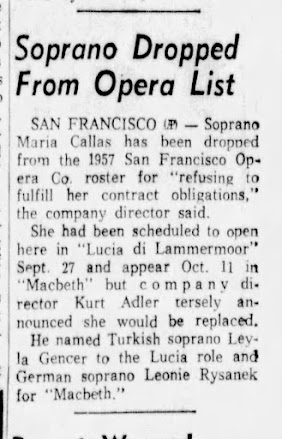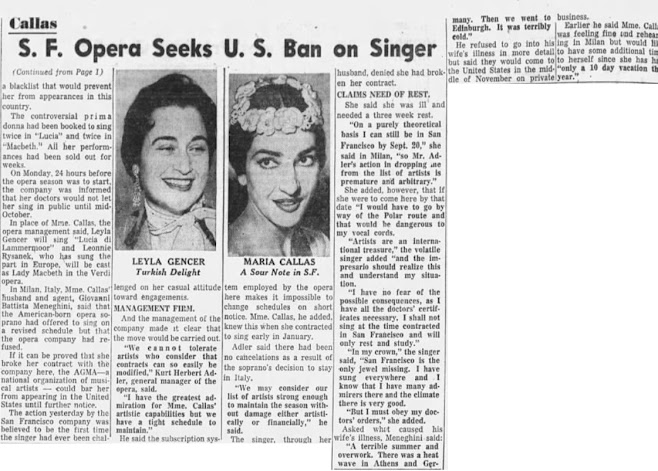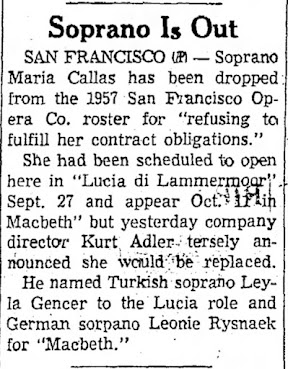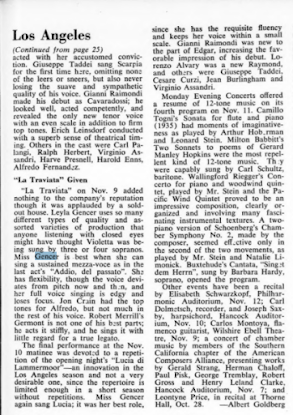OPERA WARHORSES
2007.05.16
WILLIAM BURNETT
Historical Performances: Callas Fired, An Opera
Changed – San Francisco Opera’s “Aida” at San Diego’s Fox Theater, November 7,
1957
This is the eighth of ten observances of historic
performances of the San Francisco Opera that I attended during the company’s
annual tours of Southern California
When purchasing a ticket for an opera, the opera
company’s often includes the statement that “casts and operas are subject to
change”. Over time, opera goers inevitably will experience cast changes, such
as I did earlier this year at Houston’s “Faust” (see my review elsewhere on
this website). But how often does an opera company change the opera itself,
especially on short notice?
I have known three occasions, all involving the San
Francisco Opera. As the most extreme example of an opera impresario’s agony,
Kurt Herbert Adler found himself with an indisposed Elsa (Hildegard
Hillebrecht) for a scheduled performance in 1965 of Wagner’s “Lohengrin” and
found no one in the world able to produce an Elsa in time for the performance.
His solution? Noting that a performance of Rossini’s
“Barber of Seville” was the next opera on the subscription series of which the
“Lohengrin” was part and that all members of the “Barber” cast, who had
performed the previous night, were healthy and accounted for, he reversed the
dates of the two performances, allowing time for Frau Hillebrecht to recover.
As a result, the “Barber” cast had to perform on
consecutive nights and “Lohengrin” then had to be performed twice the next week
with only a day’s rest between, but that seemed a better alternative than
cancelling the first “Lohengrin” altogether.
Presumably, most of the subscribers themselves were
indifferent to the order that they would see those two operas. However, the
subscribers are not the only persons that attend a given performance. You might
imagine the anger that the opera house doormen and ushers experienced (and I
had the testimonial of one such doorman) when those patrons who were NOT
indifferent discovered that the Wagner music drama for which they purchased a
ticket was now a Rossini opera buffa and vice versa.
Maria Callas had been scheduled to make her debut at
San Francisco Opera in September 1957, performing four times in San Francisco,
and, on the San Francisco Opera’s post-season tour of Southern California, to
perform three times at the Shrine Auditorium in Los Angeles and once at the Fox
Theatre in San Diego. When she failed to show up for rehearsals in September
for “Lucia di Lammermoor”, Adler fired her and, in cooperation with the Chicago
Lyric Opera and New York Metropolitan Opera, invoked a lockout of Callas in the
major United States opera houses.
No opera company general manager wants ever to be
forced to change an opera, and there will be various strategies to safeguard
the opera company against the illness or indisposition (not always the same
thing) of a scheduled performer. One strategy is to have a cover somewhere
nearby, which becomes one of the great advantages of having an
“artists-in-residence” program, such as one sees at the Met, San Francisco,
Houston and elsewhere.
Sometimes the cover is a person who knows the critical
role but is performing in one of the opera’s supporting parts. In 2000, Paolo
Gavanelli became ill for a San Francisco performance of the title role of
Verdi’s “Simon Boccanegra” and Nicholas Putilin, who performs Simon at the
Mariinsky Theatre/Kirov Opera, was cast as Paolo, who was in turn covered by
one of the company’s younger singers. With Putilin as Boccanegra and a new
Paolo, the performance proceeded with minimum despair.
One suspects that these days every general manager has
some sort of plan for replacing every important cast member of an opera they
are producing. And, I suspect, that the more problematical an important opera
star is (such as an artist who is known to cancel a lot for illness or other
reasons), the more effort goes into having carefully developed contingency
plans. If one is really suspicious of an artist, I would imagine, the opera
company would have taken multiple steps to safeguard against the consequences
of a cancellation.
Earlier this month, in preparing a tribute to the
Young Rysanek at San Francisco Opera in the 1950s, as well as a contemporaneous
one for Leyla Gencer that will appear on this website later this month, it
struck me that Adler had developed what in retrospect seems to be some fairly
obvious defenses against Callas cancelling her 1957 San Francisco debut season.
Adler had scheduled Callas to perform two parts, Lady
Macbeth in Verdi’s “Macbeth” and the title role in Donizetti’s “Lucia di
Lammermoor”. There are not ever a great number of divas that sing these two
roles (and almost none that sing both). But there was a great Lady Macbeth in
1957 besides Callas, and that was Leonie Rysanek, who had just made a studio
recording of the role with the reigning Macbeth, Leonard Warren. There was also
an important rising star that was preparing the role of Lucia for performances
in Trieste later that year, to be conducted by a conductor associated with the
San Francisco Opera. That Lucia-to-be was Leyla Gencer.
Rysanek was engaged to open the 1957 season on
September 17th in the title role of Puccini’s “Turandot”. After that set of performances,
she was scheduled to rehearse the San Francisco premiere production of Strauss’
“Ariadne auf Naxos”.
Leyla Gencer had been engaged as Violetta in Verdi’s
“La Traviata”, opening September 19. Her assignments for the rest of September
consisted of student matinee performances of that opera, requiring her to be
there during the entire time that Callas was to be there. Those early October
assignments for Gencer and Rysanek meant that there was no opportunity to leave
San Francisco, so that they would be around when the tours of Los Angeles and
San Diego were to begin in late October.
Callas was to sing her first Lucia on September 27 and
her first Lady Macbeth on October 11. When she did not appear for rehearsals of
“Lucia”, Adler fired her. He did not need to search the world for a replacement
for Callas as Lucia, because Gencer was there, nor did her have to search for a
Lady Macbeth, because Rysanek was there. I suspect that there was never an
explicit agreement that either artist was covering Callas, but
they were international artists, and both knew exactly which roles they shared
with the temperamental diva.
So, it appears to me that Adler had “Callas-proofed”
his season very effectively. It also appears to me that he had NOT
“Stella-proofed” it. When Antonietta Stella’s emergency surgery required
cancellation of her scheduled performances of Amelia in Verdi’s “Ballo in
Maschera” and the title role in Verdi’s “Aida”, this created a real crisis for
Adler. Rysanek rose above the line of duty by adding two additional
performances – her German-language Amelia and an Aida, and Leontyne Price’s
star also rose in the firmament when she took on two performances of the latter
opera in San Francisco and one on the Los Angeles tour.
However, the longer-term solution to Stella’s
emergency operation was engaging Herva Nelli to complete Stella’s obligations
as Aida and Amelia, including the Southern California tour. The tour had been
scheduled to perform in San Diego on two nights a week apart – with Gencer
singing Violetta and Callas singing Lucia. Callas’ cancellation and replacement
by Gencer meant that San Diego would have two separate visits by the Turkish
diva.
The spacing of Gencer’s performances would have
permitted her to have performed in a San Diego “Lucia”, and, judging from her
spectacular performance as Lucia that I saw three days later at the Shrine
Auditorium, it almost certainly would have been a great success. However, the
disappointed ticket-holders had expected Callas, and having an unknown name
(Gencer was not a household word in Southern California in 1957, and most of
the other remaining members of the “Lucia” casts were relatively unknown) twice
in a week’s time for the only two performances of San Francisco Opera in San
Diego that year, surely had to have bothered the promoters in that tour city.
The promoters likely slept easier when offered the
prospect of replacing the “Lucia” with a performance of Verdi’s “Aida” that
would have at least three familiar names to the San Diego audience – soprano
Herva Nelli in the title role, the superb mezzo-soprano Blanche Thebom as
Amneris, and veteran basso Nicola Moscona as Ramfis. All three had been
stalwarts at the Metropolitan and San Francisco Operas. Nelli’s star turn in
five Toscanini NBC Orchestra performances were among the early LP recordings of
complete operas. Unfortunately, neither the tenor, Eugene Tobin, nor the
baritone, Umberto Borghi brought any star power, and the latter did not even
bring good performance reviews from his efforts earlier in the season.
Looking at the situation retrospectively, I, of
course, would have wished that Nelli, whose voice to me never really seemed
right for Aida, would have switched the Los Angeles and San Diego Aidas with
Leontyne Price, who had a perfect voice for the role. But in September 1957
Price was no better known than Gencer, and Nelli was at least a Callas
substitute of whom many people had heard.
The singers generally met the audience’s expectations.
This was the only time that I had a chance to hear Nelli, Thebom and Moscona in
live operatic performance, and I am happy to have heard them. It is a consoling
thought that I was to see Price in “Aida” and most of her other great Verdi
roles over the next three decades.
But whatever quantities of thought went into who would
sing the roles, apparently a lesser amount went into how they would stage this
iconic grand opera in the Fox Theatre. The most vivid memory of the staging was
the triumphal march, which consisted of nine spear-carrying men walking
diagonally across the stage, circling, then walking off the opposite side.
As noted elsewhere in this website, it is my plan to
attend a performance somewhere in the world of each opera whose 50-year
anniversary I am observing. For “Aida”, I have scheduled a return to San Diego
in April, 2008 to observe the San Diego Opera’s revival of their production
directed by Garnett Bruce in what I expect will be a more appropriate staging
than what San Francisco Opera cobbled together for San Diego 50 years ago.
As a personal note, not only did the San Francisco
Opera’s tours to San Diego provide my first opportunity to see Verdi’s “La
Traviata”, “Aida” and “Otello”, but the San Diego Opera’s Verdi Festivals
during the year’s between 1979 and 1985 were the place where I saw six other
Verdi operas for the first time, for a total of nine first seen in San Diego.
The San Francisco Opera tour to the Los Angeles Shrine
Auditorium, resulted in my first performance of a tenth, with an 11th performed
by the Los Angeles Opera at the Dorothy Chandler Pavilion. San Francisco Opera
introduced me to 11 other Verdis at the War Memorial, so, with another first at
the Met in New York City, I have seen 23 Verdi operas, 22 for the first time in
California, each with great international casts.
Since I regard “Jerusalem” as a redo of “I Lombardi”
and “Aroldo” as a redo of “Stiffelio”, I count only 26 Verdi operas total. Any
opera company planning future performances of “I Due Foscari”, “La Battaglia di
Legnano” and “Alzira” should alert me, as I would be very interested in bagging
all three of those also.
https://operawarhorses.com/2007/05/16/callas-fired-an-opera-changed-s-f-operas-aida-at-the-fox-november-7-1957/




























































































































































